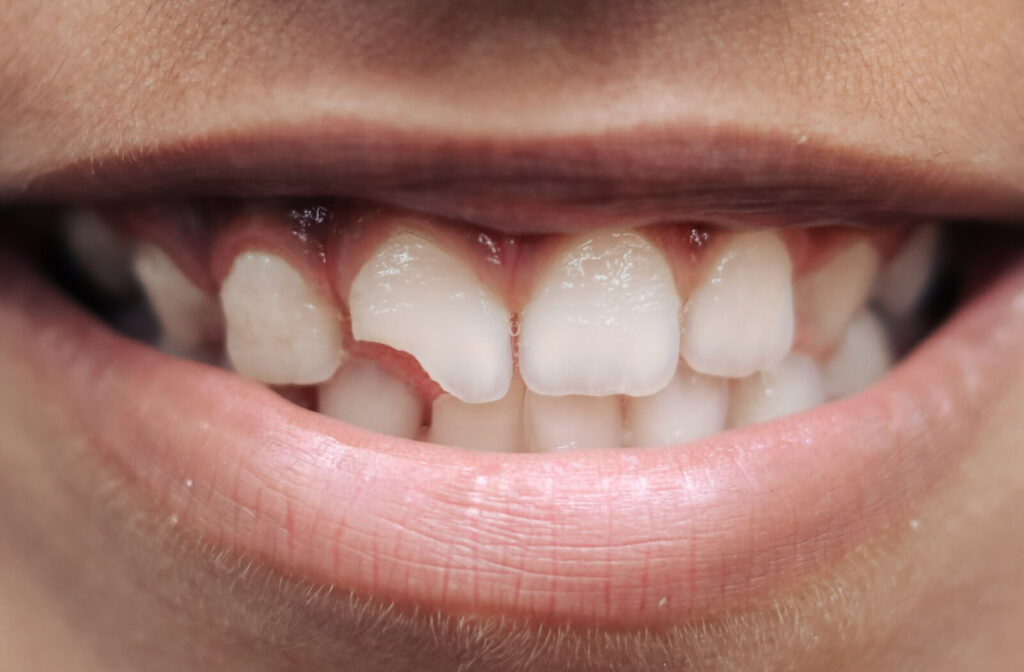Dental crowns play a crucial role in restoring the functionality and aesthetics of your smile. Whether you’re dealing with a cracked tooth, severe discoloration, or decay, dental crowns can be an excellent way to help you regain your confidence and dental health.
But how strong are dental crowns in front teeth? Front teeth experience less pressure when chewing than molars, meaning dental crowns on front teeth are durable and can last 10 years or longer. However, some factors can affect their durability.
Your dentist can assess your oral health to determine if crowns can work for your needs. They can also advise you on how to maintain them for longer durability.
What Are Dental Crowns?
A dental crown or cap is a hollow, artificial tooth placed over a damaged tooth to restore that tooth’s shape, size, and strength. A tooth can be damaged for a number of reasons, including:
- The tooth is broken
- The tooth has a large filling
- The tooth is decayed
- The tooth is discoloured
Dental crowns look and function very much like your natural teeth. Dental crowns on front teeth can serve a restorative or cosmetic purpose.
Dental Crown Procedure
A dental crown procedure involves several steps, and typically requires two visits to the dentist. During the first visit, a local anaesthetic is applied, and the tooth is prepared by removing any decay or damage and reshaping it to fit the crown. Then, dental impressions are used to create a custom-made crown that will fit perfectly over the prepared tooth.
While waiting for your permanent crown, you’ll receive a temporary one. The second visit involves removing the temporary crown and cementing the permanent crown onto the tooth. Before finalizing the crown placement, your dentist will check the fitting, bite, and comfort. They will also adjust these elements if needed.
How Strong Are Dental Crowns on Front Teeth
Dental crowns are designed to be just as strong as natural teeth, and are made from durable materials like porcelain, ceramic, and metal alloys. When properly placed and maintained, these crowns can withstand the daily wear and tear of biting and chewing.
Front teeth are often subjected to less force than molars, making them a reliable choice for dental crowns. For this reason, dental crowns on the front teeth can last 10 years or longer with good care.
Factors Affecting Durability & Longevity of Dental Crowns
Several factors come into play when determining the longevity and durability of dental crowns on front teeth. Understanding these factors can help you make informed choices about your oral health.
One major factor is the material used for the crown. While porcelain and ceramic crowns might not be as strong as metal or porcelain-fused-to-metal ones, they’re a popular choice for front teeth due to their natural appearance.
Another consideration is the skill of the dental professional. Proper placement is crucial for the durability of the crown. Your dentist will determine the material for your crown based on the following:
- Tooth location
- Visibility of the crown when you smile
- Position of your gum tissue
- Tooth function
- How much natural tooth is remaining
- Colour of surrounding teeth
Lastly, your oral care habits can impact the lifespan of your dental crown. Good oral hygiene can prolong a dental crown’s life.
Caring for Your Dental Crowns

Temporary crowns require gentle brushing and flossing to avoid dislodging the crown. If a temporary crown comes off, your dentist can reattach it or make a new one until your permanent crown is ready.
Keeping your permanent dental crowns in great shape requires both effort and care. Here are some tips to help you maintain your dental crown’s strength and appearance and prolong its lifespan:
- Good oral hygiene: Brush your teeth at least twice daily and floss daily to prevent plaque buildup around your crowns. This will help keep both the crowns and your natural teeth in good condition.
- Regular dental exams and cleanings: Your dentist will monitor the condition of your crowns and address any issues before they become serious problems.
- Avoid certain habits and foods: Using your teeth to open packages, nail-biting, and biting down on hard foods such as ice or hard candies can damage your crowns.
- Wear a mouthguard: If you grind your teeth at night, wear a mouth guard to protect your crown and the surrounding teeth.
Improve Oral Health with Dental Crowns
Dental crowns on the front teeth can enhance your smile and restore the function of your teeth. The strength and durability of crowns make them a reliable option for anyone looking to improve their oral health.
By understanding the different types of dental crowns and the factors that affect their longevity, you should be able to discuss your dental concerns with your dentist and make informed decisions about your dental care. Regular dental visits, good oral hygiene, and mindful habits will make sure your dental crowns last for many years.
Book an appointment with Belman Dental Centre for more information on dental crowns and personalized advice tailored to your needs.



